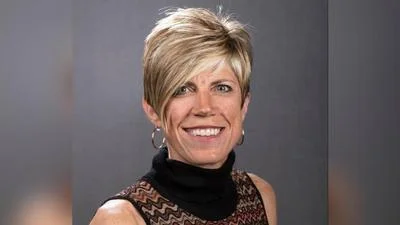University of Iowa issued the following announcement on Dec. 1.
America needs farmers, and no state knows that more than Iowa.
Through her research, University of Iowa PhD student Emily Schmitz has found a bacterium in Iowa soil that makes farmer’s work more environmentally friendly—and they may not even know they are using it.
Farming alters the environment. This leaves room for pollutants and other potentially harmful chemicals to end up where they aren’t supposed to be, like in our air or in our water.
“Agriculture is a significant source of pollution to our water bodies,” says Schmitz, who is pursuing a PhD in civil and environmental engineering at Iowa. “But it doesn’t have to be that way. There are ways to work more harmoniously with the environment.”
Her solution? Using bacteria present in the soil to minimize air and water pollutants. And it’s already happening.
The research captured first place in the Graduate College’s annual Three Minute Thesis (3MT) competition earlier this month. Schmitz was awarded $500 for the grand prize and an additional $250 for being selected as People’s Choice.
The 3MT competition helps graduate students learn how to clearly and concisely articulate their often complex and complicated research to non-experts in three minutes or less. That isn’t always easy for graduate students, most of whom have been taught to go into great depth and speak with a certain language that a non-academic, and sometimes even an academics from another field, may not understand.
The competition, historically held before a live audience in an auditorium, moved online for the second year because of the COVID-19 pandemic. After a preliminary competition, finalists recorded their three minutes and uploaded the presentations to YouTube. Judges reviewed the videos, and the winners were announced in a Zoom session on Nov. 12.
Through her research, Schmitz has found that M. Oxyfera, a naturally occurring bacterium in soil, can feed on potentially harmful chemicals like nitrate and methane and transform them into environmentally safe products.
“The nitrate produced by farming practices can be reduced using this bacterial process. When nitrogen is applied to crops, not all of it is absorbed by the plants and a good amount runs off,” Schmitz says. “The runoff can get into bodies of water and can kill fish, cause harmful algae blooms, and potentially adversely impact human health.”
The largest source of nitrous oxide emissions is agriculture soil. This greenhouse gas is 300 times more potent than carbon dioxide in terms of global warming potential. Most of these nitrous oxide emissions are a by-product of soil bacteria feeding on nitrogen.
With M. Oxyfera, that is not the case. The bacteria feed on nitrate and methane without creating nitrous oxide, providing a two-pronged approach that is ideal for minimizing pollutants in the soil and the air.
But studying microbes can be tricky since their abundance, diversity, and interactions with other microbes make measuring their impacts difficult. However, Schmitz is working to create the right environmental setting for M. Oxyfera to thrive.
“Environments and ecosystems can act like self-cleaning ovens,” says Schmitz. “We know nitrate is present in Iowa soil and contributing to water pollution. An innovate solution to addressing this environmental challenge is to use what is already present in the soil, bacteria. We just have to figure out which buttons to press, like how to get M. Oxyfera to be more abundant to remove pollutants, and then provide the time for nature to run its course and do the work for us.”
Schmitz, a native of Austin, Texas, graduated from University of Texas with a degree in chemical engineering and found Iowa appealing because of its unique approach to scientific progress.
“When I was looking at grad schools, I saw that Iowa really wanted to focus on a holistic approach to environmental engineering. This included incorporating politics and economics in addition to the science. In this way, we can effectively apply and communicate our science in the future,” says Schmitz. “That is why I came here.”
GRAND PRIZE WINNER ($500)
- Emily Schmitz, College of Engineering, is studying how to use unique bacteria to treat nitrate, methane, and nitrous oxide pollution from agricultural sources.
- Matthew Nagorzanski, College of Engineering, for his research on developing polymer nanofiber materials and deploying them in water pipes to detect contaminants.
- Parham Parnian, College of Liberal Arts and Sciences, for his work in developing nonsurgical therapeutic techniques to treat medical implant infections.
- Emily Schmitz

Original source can be found here.





 Alerts Sign-up
Alerts Sign-up